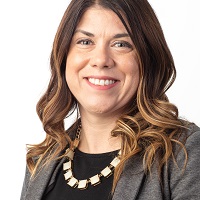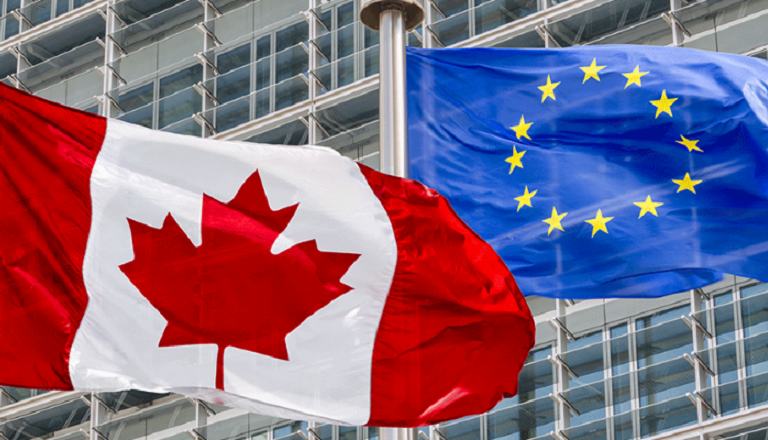Europe is already a huge export market for Canada, receiving upwards of $40 billion a year in products and nearly $20 billion in services from Canadian exporters. It’s also a market brimming with potential — not to mention 500 million consumers. So says Peter Hall, EDC’s Chief Economist, who took part in our recent, well-attended webinar called CETA: Unlocking the Potential, available here.
Our webinar panel of trade experts were able to share valuable insights to our audience on the benefits of the Comprehensive Economic and Trade Agreement (CETA) and how it opens the doors for Canadian exporters.
As CETA is now in force (as of September 21), Hall said exporters need to understand the market conditions in Europe. The continent has seen a lot of negative press in the past 10 years but EDC, as well as larger organizations such as the Organisation for Economic Co-operation and Development (OECD) and the International Monetary Fund (IMF), has recently upgraded its forecast for Western Europe.
“This is a moment where pent-up demand is actually pushing things forward,” Hall said. “We’ve upgraded our forecast to 2 per cent growth for this year and 1.7 per cent next year.”
With CETA’s ratification, there was no question we needed to provide a webinar on this topic. At EDC, we are getting a lot of questions from Canadian exporters about CETA and how the new agreement will impact their business. With so many inquiries, we knew we needed to address this topic on a larger scale. An interactive webinar gives exporters the added advantage of a direct line to our Trade Experts to address any questions they might have.
What are some of those concerns? Of course, there’s Brexit, but in spite of that, business does appear to be soldiering on. We’ll want to keep our eyes on it, Hall said, but it doesn’t appear that it will slow trade much at this point.
So how does one get started with CETA? Trade lawyer John Boscariol says exporters should look at the rules and regulations dealing with their goods when they arrive at the border, such as tariffs and rules-of-origin declarations. They should also look at after-border concerns, such as product safety and labelling.
Boscariol concentrated on the border-arrival intricacies. Exporters must make a three-element declaration at the border, he said.
- The first is the classification of their product, found through an international nomenclature developed under the World Customs Organization. Finding out how a product is classified will determine the duty required.
- Second is the value of the product, which will determine that percentage of ad valorem taxes owing.
- The third element is the origin of the product. If it qualifies as originating in Canada, it will likely have zero duties under CETA. Note that for a few select products, going duty-free will have a phase-in period, but 98 per cent of products will have zero duty as of September 21, 2017.
Boscariol also noted that while there are opportunities with trade agreements, there are also challenges. Increased competition from EU producers in Canada is one example. In addition, EU companies now have access to procurement opportunities at all levels of government in Canada, and vice-versa.
Ailish Campbell, Canada’s Chief Trade Commissioner, was also on hand as a member of our panel offering the Trade Commissioner Service’s (TCS’s) very hands-on advice for would-be exporters to Europe. She also recommended downloading the TCS Guide to Exporting to Europe.
Campbell said business owners will have to do their research on what’s attractive to EU consumers. She recommended contacting a trade commissioner, located across Canada, Europe and other countries, for guidance.
According to Campbell, the top three things Global Affairs Canada can do for exporters include:
- The tariff finder: Find out what your product’s tariffs will be, if any.
- CanExport: This program can provide financial assistance to exporters going into a market they have never tried before.
- The Trade Commissioner Service: Consultants are at your service at regional offices to help you navigate CETA’s complexities and find new opportunities.
Hearing a fellow exporter’s personal experiences on our speaker panel is always a highlight for webinar participants. Exporters want to know what other exporters are doing, and to learn from each other. Dannie Hansen, of Louisbourg Seafoods, Ltd joined us in our EDC studio. He told us how he studied Europe tirelessly to determine which of his seafood products would be best received. The answer was shrimp and lobster. Hansen advises other exporters to carefully analyze how the government can help you create an exporting plan. He also recommended talking to neighbours and colleagues who are also exporting about their experiences.
Asked for his best pieces of advice, Boscariol said it’s more important than ever to consider trade agreements such as CETA in your strategic planning. Second, he suggested staying on top of things on the customs side; You’ll be required to give a statement to the European importer about where these products originate, for example. What if it’s wrong and it’s determined thousands of dollars in duty are owed? Will you or your customer be required to pay it? Or what if customs decides to do an audit? He said those kinds of issues should be addressed in your contract with your importer. During the Q and A session of the webinar, Boscariol also noted that in cases where there is a lot of uncertainty regarding a product’s rule of origin, an advance ruling may be obtained before shipping.
Campbell noted that southern and eastern European countries are transforming their economies and growing fast. She encouraged exporters to see the TCS as a “risk partner” and a tool to help create a smart business plan.
Hansen reiterated his suggestion to speak with fellow exporters to minimize risk. He also recommended branding your products as Canadian.
The webinar contained lots more useful information, so feel free to click here to watch a full recording.






